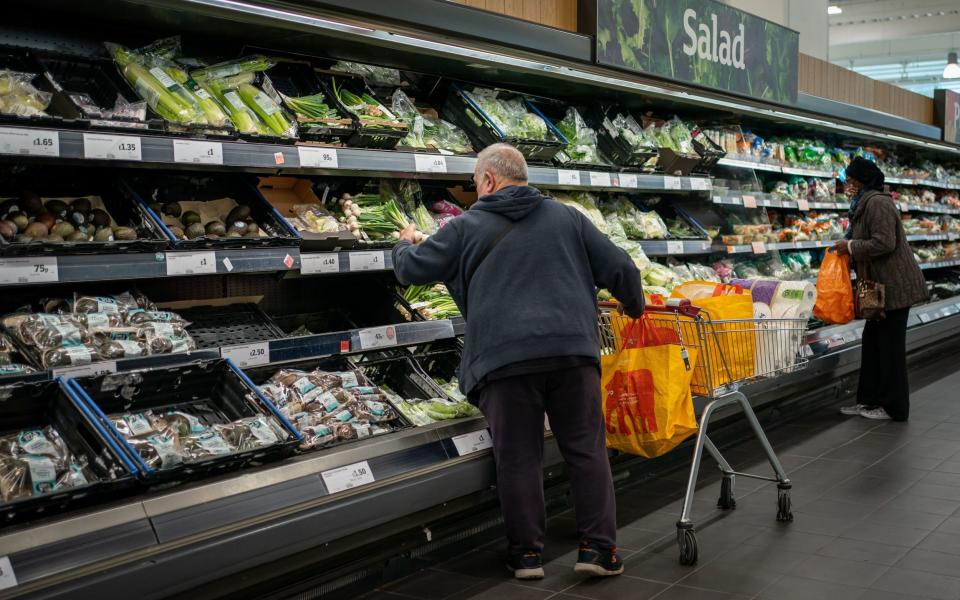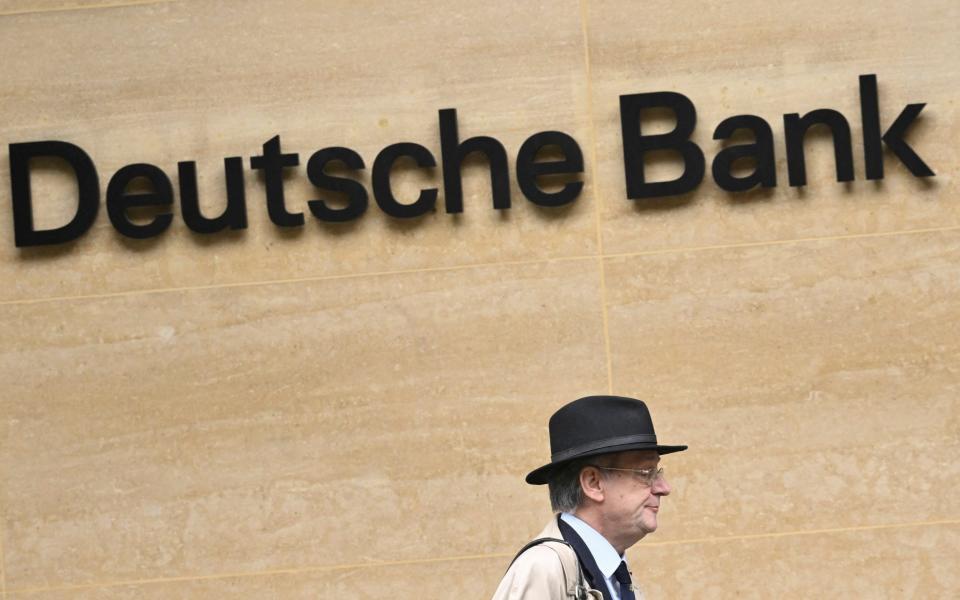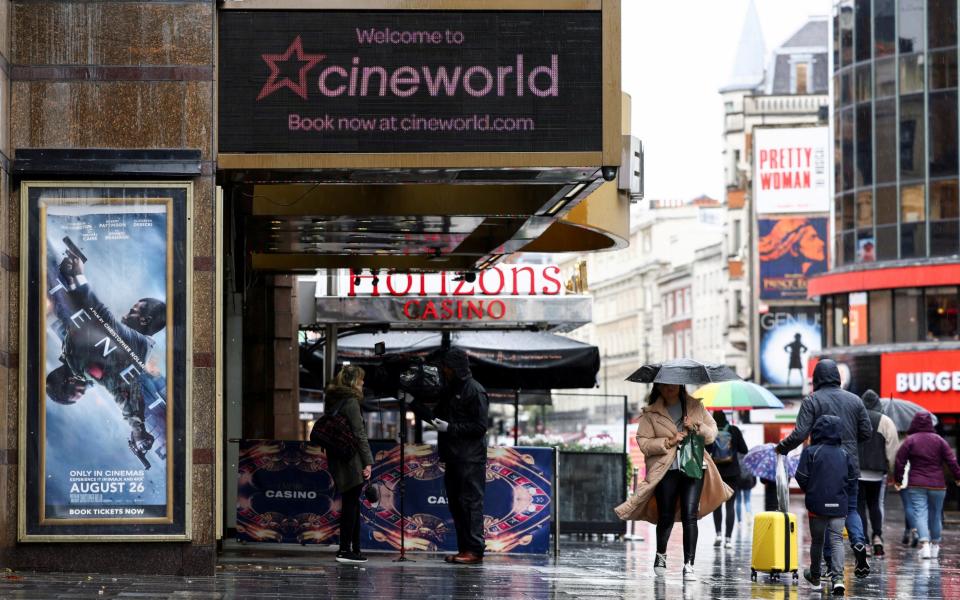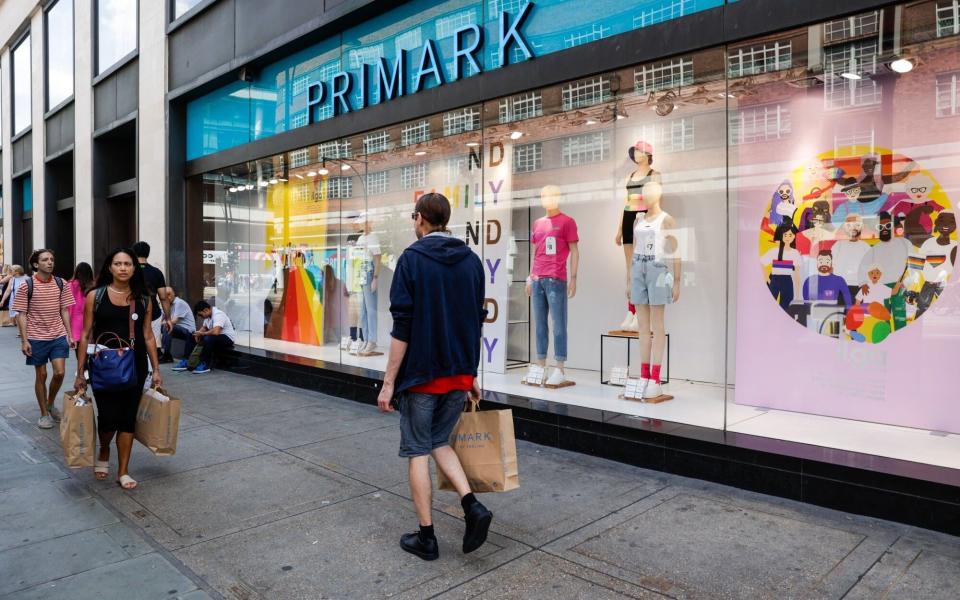
Germany risks staying mired in recession this year after a closely-watched barometer of business activity slumped in June.
The decline, led by a “substantial” decline in manufacturing, saw the closely-watched Ifo business climate index slump to 88.5 in June following May’s reading of 91.5.
This is the lowest reading since November 2022, in the wake of a surge in energy costs and well below analysts’ expectations for a fall to 90.7.
All sectors of the German economy suffered a decline, according to the survey, which noted that in manufacturing “the business climate deteriorated substantially”.
It added: “Hardly any industry has been left untouched by this development.”
Carsten Brzeski at ING said the “collapse” in activity suggested “the rebound of the German economy has ended before it ever really began”.
He added: “The weaker-than-hoped-for Chinese reopening, a looming US recession and ongoing monetary policy tightening seem to be weighing on German company sentiment.
“Also, the growing feeling that Germany is in for a longer period of subdued growth seems to have reached German business.”
Klaus Wohlrabe, head of Ifo surveys, said the German economy now “faces the prospect of a longer recession as domestic demand and the expectations of exporters have both weakened”.
Read the latest updates below.
11:00 AM BST
Hope for German rebound ‘is nothing more than hope’
German business morale worsened for the second consecutive month in June, a closely-watched survey has shown, indicating that Europe’s largest economy faces an uphill battle to shake off recession.
Economics editor Szu Ping Chan has this insight:
Europe’s largest economy is already suffering a technical recession after shrinking 0.3pc in the first quarter of 2023.
This follows a drop of 0.5pc in the final quarter of last year.
Carsten Brzeski at ING has warned that Germany now risked years of stagnation.
He said: “Today’s disappointing Ifo index reading suggests that the hoped-for rebound of the German economy is nothing more than hope.
Optimism is fading and the economy faces new growth concerns.
“We are not saying that the economy will be stuck in recession for the next couple of years, but with several short and long-term challenges, growth will remain subdued at best.”
10:50 AM BST
Rouble recovers after selloff in wake of Wagner coup
The Russian rouble has clawed back its losses after it tumbled to its lowest in nearly 15 months against the dollar in early trading as investors responded for the first time to an aborted mutiny by heavily armed mercenaries in Russia over the weekend.
The rouble has recovered to be 0.2pc stronger against the dollar at 84.64, recovering after hitting 87.23, its weakest point since March last year.
It had gained 0.3pc to trade at 92.10 versus the euro and 0.5pc against the pound to 107.79.
Mercenaries led by Yevgeny Prigozhin withdrew from the southern Russian city of Rostov-on-Don overnight on Saturday under a deal that halted their rapid advance on Moscow but left questions about President Vladimir Putin’s grip on power.
Alexey Antonov of Alor Broker said:
Politics is again having a negative impact on investors’ mood.
The peak of tensions has passed, but an unpleasant residue will linger for some time.
10:35 AM BST
Wrexham-owners Reynolds and McElhenney take stake in F1 team
Hollywood actors Ryan Reynolds and Rob McElhenney are joining an investor group taking a 24pc equity stake in the parent company of the Renault Formula One team.
The €200m (£171m) deal values British-based Alpine Racing at around $900m (£706.5m) following the investment.
Alpine Racing’s board of directors will be expanded to include Alec Scheiner, the co-founder and partner of Otro Capital, which is among the investors, along with RedBird Capital Partners.
‘Deadpool’ star Mr Reynolds leads Maximum Effort Investments with Mr McElhenney, of American comedy series ‘It’s Always Sunny in Philadelphia’, and fellow-actor Michael B Jordan as co-investors.
Mr Reynolds and Mr McElhenney took over Wrexham in November 2020, funding the club’s return to the Football League as Conference champions in April this year.
Their popular docu-series ‘Welcome to Wrexham’ has proved a big hit in North America, propelling the little-known club into the global spotlight.

10:16 AM BST
Disposable income falls for 80pc of homes
Eight in 10 British households suffered a drop in their disposable incomes last month as rising living costs continue to weigh on spending.
Some 40pc of households are in negative income territory — where take-home-pay does not cover bills and essentials — according Asda’s income tracker.
The average shortfall for those families was £42.50 ($54.16) a week in May.
It comes as inflation remained at 8.7pc in May, unchanged from the previous month, forcing the Bank of England to raise interest rates to 5pc in a blow to mortgage holders.
The effect of inflation on shoppers is particularly pronounced for supermarkets, with food price inflation standing at 18.4pc.
Bosses from Tesco, Sainsbury’s Asda and Morrisons will answer questions from the business committee of MPs on Tuesday.
09:58 AM BST
Sainsbury’s cuts prices as Chancellor plans to meet regulators
Sainsbury’s has unveiled £15m of price cuts across cupboard essentials such as rice and pasta as the Chancellor prepares for a meeting with regulators aimed a tackling so-called “greedflation”.
Britain’s second largest supermarket will roll out the reductions on the own-brand items from Tuesday, also lowering prices on staples including corn flakes, jams and runny honey.
The company added that, from Monday, all Sainsbury’s “happier and healthier” whole chicken breast fillets will be price-matched to Aldi for the first time.
It pledged to continue cutting prices on essential products throughout the summer.
The move comes as supermarkets are under increasing pressure to hand down savings they are seeing on wholesale items to consumers, who have faced punishing food price inflation in recent months.
The Bank of England suggested last week that some retailers are jacking up prices or failing to pass on lower costs to consumers as a way of increasing their profit margins at a time of stubborn inflation – a process known as “greedflation”.
Chancellor Jeremy Hunt is to meet the Competition and Markets Authority (CMA) and the watchdogs for the energy, water and communications sectors on Wednesday to ask whether there is a profiteering problem in their sectors and what they are doing about it.

09:44 AM BST
Typical mortgage rate highest in seven months
Britain’s mortgage crisis shows no sign of abating as the average rate of a two-year fixed deal climbed to its highest level since November last year.
Borrowers taking out a deal today will typically have to pay 6.23pc from today, up from 6.19pc on Friday, according to Moneyfacts.
The average five-year fixed residential mortgage rate also inched up to 5.86pc, up from 5.83pc on Friday, which is also the highest since the end of November.
09:25 AM BST
German outlook has ‘clouded over noticeably’
Ifo’s president Clemens Fuest said “sentiment in the German economy has clouded over noticeably” after data showed morale took a hit for the second straight month.
The Ifo institute said its business climate index stood at 88.5 following a reading of 91.5 in May.
Business expectations were significantly more pessimistic, falling to 83.6 in June from 88.3 in May.
Companies also assessed their current situation more poorly, with the sentiment evaluating current conditions falling to 93.7 from 94.8.
09:19 AM BST
German businesses losing confidence
German business morale worsened for the second consecutive month in June, a survey has shown, indicating that Europe’s largest economy faces an uphill battle to shake off recession.
The Ifo institute said its business climate index stood at 88.5 following a reading of 91.5 in May. A Reuters poll of analysts had predicted a fall to 90.7 in June.
09:08 AM BST
HSBC to leave Canary Wharf for BT’s former head office
HSBC is planning to leave its Canary Wharf headquarters and relocate to the City of London, the latest sign of how a shift to flexible work is reshaping demand for offices.
The lender, which launched a review in September, will tell staff today that its preferred option is BT’s former head office near St Paul’s, according to the Times.
The bank said it “will now now begin more detailed discussions on a potential lease, with the intention to move in late 2026”.
HSBC has been looking for alternatives to its Docklands skyscraper as it looks to a more flexible workspace and adapts to the post-pandemic cityscape.
The lease on its current address is due to expire in 2027.
Orion Capital Management, a private equity firm, is redeveloping the former BT headquarters on Newgate Street.
HSBC has resided in the 45-story 8 Canada Square building since 2002, when it was completed by Canary Wharf Group.
The building is now owned by Qatar’s sovereign wealth fund, which bought it for about £1.1bn in 2014.

09:02 AM BST
FTSE 100 slumps as energy stocks hit
The FTSE 100 has slumped to a three-month low as financial and energy stocks suffered in the wake of the political instability over the weekend in major crude producer Russia.
The blue-chip index was down 0.3p, while the more domestically-focussed FTSE 250 midcap index has dropped 0.5pc.
The FTSE oil and gas index was down 0.2pc while banks slumped 0.7pc amid concerns for the UK economy as interest rates look set to move higher for longer.
Lloyds fell 1.9pc after JP Morgan downgraded the bank’s rating to “underweight” from “neutral”.
Shares of Aston Martin has jumped 10.3pc after the luxury carmaker said it would enter into a strategic supply agreement with US electric vehicle company Lucid Group.
Cineworld Group dropped as much as 34.4pc after the cinema chain operator said it will file for administration as part of a proposed restructuring plan.
08:52 AM BST
Deutsche Bank issues warning on Russian shares held by its clients
Deutsche Bank has reportedly told clients it can no longer guarantee full access to Russian stocks that belong to them, underlining the challenges global investors face to recover stranded investments in the country’s companies.
The bank has discovered a discrepancy in so-called depositary receipts (DRs) – the certificates issued by a bank representing shares in a foreign company traded on a local stock exchange.
Germany’s largest bank said in a note dated June 9 that it had uncovered a shortfall in the shares linked to the DRs the bank had issued before the Ukraine invasion, according to Reuters. The shares have been held in Russia by a different depositary bank.
In the circular, Deutsche attributed the shortfall to a decision by Moscow to allow investors to convert some of the DRs into local stock.
The conversion was carried out without the German bank’s “involvement or oversight” and Deutsche was unable to reconcile the company shares with the depositary receipts.
It is the first major bank to formally inform depositary receipt holders that they may not get take ownership of precisely all the shares they are entitled to, Reuters reported.

08:33 AM BST
Aston Martin shares surge following electric vehicle deal
Aston Martin shares have jumped by the most in five weeks after revealing a strategic supply agreement for high performance electric vehicles from Lucid Group.
Lucid will gain about a 3.7pc stake in the UK company in exchange for supplying Aston Martin with select powertrain components for battery electric vehicles.
The agreement would also complement the bespoke development of a single battery electric vehicle platform by Aston Martin and support the company’s target to launch its first such vehicle in 2025.
Yew Tree Overseas, which owns about 21pc of Aston Martin’s shares, has agreed to back the supply deal.
Aston Martin shares have gained 12pc.

08:15 AM BST
Markets muted following short-lived Russian coup
There have been big moves in the value of Russia’s currency and European gas prices following the geopolitical shock that challenged Vladimir Putin’s rule.
However, aside from those areas, global markets have been a picture of relative calm.
Russia has largely become cut off from from global financial markets due to sanctions imposed since its invasion of Ukraine, thus limiting the impact on Monday.
As a result, initial moves have been modest and reflected the impact of a deal that was brokered to halt the Wagner mercenary group’s advance toward Moscow.
The agreement includes dropping criminal mutiny charges against Yevgeny Prigozhin and his fighters.
Hong Kong shares of Russian aluminum producer Rusal, which offer some insight into appetite for the nation’s assets, fell as much as 2.9pc.
08:07 AM BST
UK markets edge up
It has been a relatively quiet start for the markets in London despite the extraordinary weekend in Russia.
The FTSE 100 has begun the day flat at 7,461.11 while the midcap FTSE 250 has risen 0.2pc to 18,103.12.
07:51 AM BST
Cineworld still ‘business as usual’
After announcing its intention to file for administration, Cineworld said:
Cineworld continues to operate its global business and cinemas as usual without interruption and this will not be affected by the entry of Cineworld Group into administration.
The group and its brands around the world – including Regal, Cinema City, Picturehouse and Planet – are continuing to welcome customers to cinemas as usual.
The group continues to honour the terms of all existing customer membership programmes, including Regal Unlimited and Regal Crown Club in the United States and Cineworld Unlimited in the UK.
07:44 AM BST
Cineworld shareholders face wipe out as chain files for administration
Stricken cinema chain Cineworld has said it will file for administration in the UK as part of a restructuring plan that is set to wipe out shareholders.
The world’s second largest cinema chain said it will apply for administration for the London-listed company in July, which will see shares in the firm suspended.
But it stressed that the move will not impact the British operations for the holding company, with cinemas continuing to remain open as usual.
Cineworld filed for Chapter 11 bankruptcy in the US last year after being weighed down by its mammoth debts and weaker-than-hoped audience numbers.
The group, which also owns the Picturehouse brand, is moving forward with plans to restructure its near $5bn (£3.9bn) debt pile to allow it to exit bankruptcy.
It is also looking to raise $800m (£628m) through a rights offering and secure $1.46bn (£1.1bn) of new debt financing.

07:32 AM BST
Gas prices jump after failed coup in Russia
European natural gas prices have jumped amid nervousness over the short-lived rebellion in Russia.
Benchmark futures rose as much as 8.4pc with gas already having soared about 30pc this month as outages and nervousness about supply roiled markets.
The dramatic mutiny over the weekend is the latest factor adding to volatility.
While Europe has significantly reduced its dependence on Russian pipeline gas, it still receives large amounts of Russian LNG.
Tom Marzec-Manser, head of gas analytics at ICIS in London, said:
Russian geopolitical risk now is significantly higher than before the weekend.
The uncertainty of what could happen in the coming weeks within Russia itself – rather than within Ukraine – is likely to push markets higher on Monday.
Dutch front-month futures, Europe’s pricing benchmark, were last up 7.4pc to just below $35 per megawatt hour.
07:25 AM BST
Primark owner boosts profit outlook as prices rise
The owner of Primark said its sales jumped over the latest quarter amid higher prices, and was now upgrading its full-year profit expectations.
Associated British Foods, which also has major sugar, ingredients and other food businesses, said its total sales surged by 16pc over the three months to the end of May to £4.7bn.
Sales in Primark grew by 13pc across its global stores, helped by higher average selling prices for its products, the firm said.
Seasonal clothing and accessories, as well as health and beauty products sold particularly well during the period, the retailer said.
The company now expects its adjusted operating profit for the full year to be slightly ahead of last year.

07:22 AM BST
Rouble tumbles to 15-month low after failed coup against Putin
The Russian rouble tumbled to a near 15-month low against the dollar as markets responded for the first time to the short-lived military coup against Vladimir Putin.
The rouble has lost as much as 3pc against the dollar, hitting 86.88 as markets opened, its weakest point since late March last year, about a month after Russia invaded Ukraine.
The rouble has lost about 13pc of its value against the US currency this year, making it one of the worst performers among emerging markets worldwide.
It comes as Goldman Sachs warned that the world faces the risk of higher oil prices long-term, although Brent crude was little changed overnight after the Wagner mercenary group called off its march on Moscow over the weekend.
Analysts at the bank believe that while the short-term impact is likely to be muted, the unprecedented challenge to Putin’s authority risks a supply shock if the Russian leader’s 23 years in power come to an end.
Daan Struyven and Callum Bruce said: “The higher risk of lower supply at some point may put some upward pressure on prices.”
Goldman Sachs addressed a slate of possible, longer-term risks. Since the rebellion was initiated around Rostov-on-Don in the south — by the Sea of Azov, which filters into the Black Sea — oil infrastructure in that region may face a relatively higher risk of disruption or blockade, it said.
RBC Capital Markets LLC analysts including Helima Croft said: “The immediate challenge to the Putin regime appears to have receded.
“However, the risk of further civil unrest in Russia now must be factored into our oil analysis for the back half of the year.”
Oil was slightly higher after the Wagner Group abandoned its coup against the Putin regime having marched to within 150 miles of Moscow virtually unopposed.
Brent crude has gained 0.6pc to more than $74 a barrel while the rouble dropped to a 15-month low early in Moscow.
Russian mercenaries made a short-lived rebellion on Saturday, seizing the southern city of Rostov and advancing on Moscow demanding the removal of Russian military commanders in charge of the war in Ukraine.
The private Wagner army then withdrew after striking a deal guaranteeing their safety and the passage of their leader, Yevgeny Prigozhin, to Belarus.
Ray Attrill, head of foreign exchange strategy at National Australia Bank in Sydney, said: “I don’t think the market can get its head around working out if there are implications.”

07:13 AM BST
Good morning
The rouble dropped to a 15-month low in Moscow as an aborted weekend mutiny by the Wagner Group of mercenaries raised questions about Russian stability.
Oil was little changed but faced warnings about its long-term outlook from Goldman Sachs as rhe unprecedented challenge to Vladimir Putin’s authority risks a supply shock if the Russian leader’s 23 years in power come to an end.
5 things to start your day
1) Putin increases charges for flying over Russia | Kremlin seeking to recoup fees lost from West’s ban on using airspace
2) Britain’s house price crash ‘will be the worst in the world’ | Downturn expected to be longest in the West after interest rate rise hammers mortgage market
3) Britain’s offshore wind industry is running out of puff | Key projects are buckling under the weight of spiralling costs and rigid planning rules
4) Ministers ‘letting Huawei off the hook’ | Anger towards Government’s lack of transparency over monitoring of Chinese tech company
5) Basket case Britain is back – and a recession is inevitable | Bank of England must keep raising rates to bring soaring prices under control
What happened overnight
Asian shares are mixed after a short-lived armed rebellion in Russia added to uncertainties over the war in Ukraine.
Benchmarks rose in Hong Kong, Tokyo and Seoul and fell in Shanghai and Sydney. Oil prices were little changed.
Japan’s benchmark Nikkei 225 recouped early losses, gaining 0.2pc to 32,846.24. South Korea’s Kospi rose 0.5pc to 2,581.83.
Hong Kong’s Hang Seng was up 0.1pc to 18,898.51, while the Shanghai Composite, reopening after a holiday, dropped 0.7pc to 3,173.37.
Australia’s S&P/ASX 200 lost 0.4pc to 7,070.30
Wall Street marked its first losing week in the last six Friday.
Broaden your horizons with award-winning British journalism. Try The Telegraph free for 1 month, then enjoy 1 year for just $9 with our US-exclusive offer.

